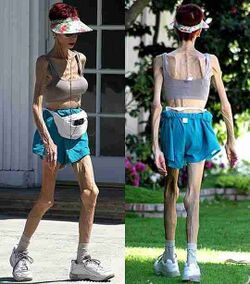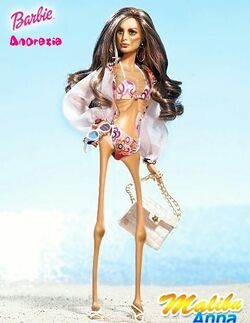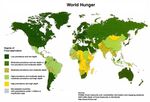Anorexia
“All the benefits of bulimia, without the mess.”
“What! They want to be skinny?!”
Anorexia (also known as Nicole Richie Syndrome) is the culinary art of preparing, cooking and serving air. Those who practice anorexia are called "Anorexicans", as they live predominantly in Southern California. Anorexia is the most prestigious of the eating disorders (often described as the "Lo-Cal cream of the crop"); less meritorious candidates who do not fulfill all the eligibility criteria for anorexia typically receive the intermediate honorific, "Eating Disorder Not Otherwise Specified" (EDNOS), until such time as they are able to lose more weight and qualify as a full-fledged anorexic (see below).
Anorexia was passed to humans from stick insects (Ctenomorpha chronus) in 1892, being first contracted by a pervert who worked at the San Diego Zoo. However, with the passing of time, anorexia became more and more fashionable. Anorexia is considered the courteous alternative to bulimia, which is much more messy.
During a brief period following the stock-market crash of 1929, anorexia became compulsory in the USA and penniless investors began ingesting ramen noodles with flavored water as their only sustenance. Videos of the period show former corporate executives selling apples from pushcarts as the anti-eating trend caught on. By the time that World War II spurred America back to prosperity, these austere habits were ingrained and could not be shaken.
Qualifying as an anorexic[edit]
Anorexics generally have at least 14 ribs protruding, preferably more. They should also be able to see through the criticisms and euphemisms used by friends and family; for example, realising that "You look malnourished!" actually means "You look fat", and "My, you've lost weight!" also means "You look fat."
More formally, the DSM-IV TR stipulates that in order to receive all the benefits and privileges afforded to anorexics, candidates should:
- Have lost at least 35% of their ideal body weight.
- Realise the dangers and harm involved in not starving themselves.
- If female, have not had a period in a year.
Scientific studies[edit]
Anorexia stems from a mixture of biological, social and psychological factors, although reinforcement to women through visual images by the media has been found to be the most significant cause.
In the 1950s, the US government found spare time from building fallout shelters to prepare a propaganda videotape on the extreme dangers of eating fitfully. Footage of slim, successful celebrities was superimposed with weight-loss tips. Few viewers, particularly children because of their short attention spans, ever watched until the very end of the tape, which contained a health warning with gory images, cautioning that following the instructions would inevitably lead to death in less than 2 years from starvation and over-exercising.
Evidence for this socio-cultural explanation comes from longitudinal and cross-sectional studies:
- Anorexia occurs mainly in Western societies, where television is most prevalent, and which occasionally play the government videotape in lieu of paid advertisements at the end of a sales period.
- Anorexia rates have steadily increased along with television sales. Prior to the invention of color TV, there were very few cases of anorexia.
For ethical reasons, there are very few large-scale experiments to replicate this project of reliably causing a wave of anorexia. One study in Afghanistan, run by Taliban psychologists, demonstrated that their policy of banning television and tabloids was successful in suppressing anorexia. Regrettably, Professor Osama bin Laden encountered unforeseen obstacles as he was preparing to submit his paper to the International Journal of Eating Disorders.
Dozens of in-depth studies of twins who had been separated at birth have revealed that, even when genetics are identical, anorexia makes people more attractive. One notorious study, linking anorexia to love, was the "Skinny Bitch Switcharoo Project." In the study, researchers secretly replaced a married woman with her non-anorexic twin. Despite the greater cushin' for his pushin,' the husband reported a steady decrease in physical attraction. His anorexic wife, interestingly, had an affair with one of the social scientists involved in the study, who characterized the sex as "very good to excellent." Unfortunately, the relationship caused some broken bones in the subject, due to weakened bone structure from malnutrition, and the study was suspended.
Anorexia as national policy[edit]
Among the startling changes that America took after electing self-styled "transformational" President Barack Obama, anorexia was established as official government policy. The changes were subtle at first, with First Lady Michelle Obama — herself hardly at risk of the ailment — starting a health campaign called "Let's Move!" and agitating for unhealthy food at school cafeterias to be replaced with broccoli-based dishes that would be purchased and discarded, the pupil salvaging only the penny-sized garnish of fat-free cheese. Mayors across America used Health Departments and food inspections to eliminate large servings of soda pop.
In 2010, the President's signature health-care reform was passed, and agencies from the IRS to the new Health Choices Administration, suspiciously staffed with low-calorie radicals, would enforce the "new austerity." Americans would come to find that they could not only keep their original plan if they liked it, but could not keep that second portion of mashed potatoes and gravy. About the resulting pangs of hunger, the President famously said, "Maybe you'd be better off with a pain pill."
The Republicans, coincidentally weighing in at an average 300 pounds, were curiously unpersuasive in opposition to the imposition of anorexia on a hungry nation — which took time away from being curiously unpersuasive on their other goals.
Treatment[edit]
Often jealous family members or friends will attempt to sway anorexics from their chosen path to perfection. In cases where an anorexic is seen as particularly successful at maintaining their slim figure, they may even organise an intervention and have them hospitalised and force-fed.
Luckily, these schemes are inevitably doomed to fail. Health insurance companies - already averse to paying for any kind of treatment - are particularly reluctant to pay for therapy programs for anorexia because they see nothing wrong with it, and most policies do not include free meals and accommodation. Furthermore, even if an anorexic is unfortunate enough to be subjected to these programs, most are sufficiently strong-willed to lose all the gained weight (and more) soon after discharge, having learnt new weight-loss methods from fellow patients.
Cures[edit]
Anorexia is not a choice, it is a lifestyle. Besides, everybody hates fat people, so how can it be a bad thing? This isn't something you so much want to "cure," but rather something you should cherish and embrace (indeed, National Eating Disorders Awareness Month was established so more people can learn about the benefits and advantages of being anorexic). You are one of the beautiful people, you are chosen! Stay strong with your choice of diet; you have to be all that you can be. There is no going back, you have to have the testicular fortitude to just say NO to food. Do you hear that, Fatty? No means no. If I catch you eating anything aside from fat-free bits of pre-chewed gum, so help me God I will break out the wire coat-hangers on you! You hear me? Look good, damn you! You know you're worth it!
The bottom line is that, if you feel hungry, then eat something. Nice and greasy is preferable, like a triple cheeseburger, a large fries and a coke. It feels good on an empty stomach and it takes a lot more than that to pack on the pounds. So don't stop there; get into chicken, bacon and T-bones. You'll be surprised how nice they taste and how well they hit the spot compared to the half crouton and a lettuce leaf you're used to.
That was just a test. You didn't eat anything, right?




